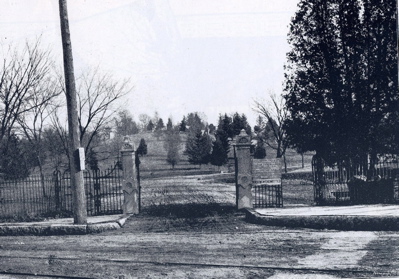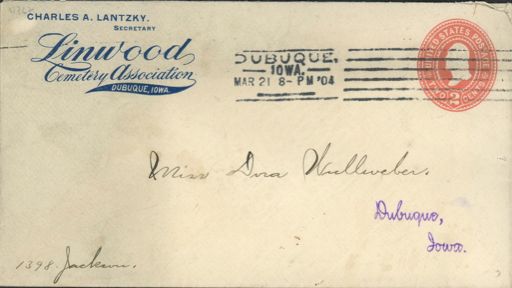Encyclopedia Dubuque
"Encyclopedia Dubuque is the online authority for all things Dubuque, written by the people who know the city best.”
Marshall Cohen—researcher and producer, CNN
Affiliated with the Local History Network of the State Historical Society of Iowa, and the Iowa Museum Association.
LINWOOD CEMETERY
LINWOOD CEMETERY. The first rural city-owned cemetery in the Midwest. The first cemetery for the city of Dubuque was located in what is now called JACKSON PARK. As the community grew, residents in the area did not like the cemetery near their homes and the site was quickly becoming too small. City planners also wished to extend Iowa Street to 17th Street. The city condemned the cemetery and would not allow more graves to be dug. In 1853 a site called Cherry Hill, the present Linwood Cemetery, was chosen.
In April 1865, the process of reinterring sixty graves from Jackson Square began with most of the work done in 1867. Although technically under the care of the City, Linwood was a scene of disorganization. There were no carriage or footpaths. Weeds and brush grew so dense it was said not even a rabbit could get through.
The sad state of affairs at the city cemetery, which by 1875 had grown to thirty-nine acres, led nineteen prominent citizens to form the Linwood Cemetery Association. Its president was John T. HANCOCK. This group called for a citywide vote in October 1875, to determine whether they should take over the care of the grounds. With only men allowed to vote, the City by a vote of 697 to 308 was removed from the cemetery business.
The Linwood Cemetery Association was legally established on August 28, 1875. Articles of incorporation stated that stockholders would receive six percent interest and gradually the return of their original investment. Surplus money from the sale of lots would then be used to beautify the grounds.
By 1907 the cemetery grounds expanded to 147 acres, and adult graves (lined in brick) sold for fifteen dollars. Previously graves had been priced by length and were eight to twenty dollars. Grass clipping cost two cents, and water hydrants for the use of the lot owner were available at two dollars.
Originally Linwood was known as the Protestant Cemetery. Today, with over sixty thousand persons buried there, the cemetery serves the needs of all faiths.
Linwood is unique because the city's CIVIL WAR Soldiers' Monument, dedicated on November 5,1893, after twelve years of fund-raising, stands in the cemetery instead of the town square where most cities placed such a monument. Another memorial is the elaborate gateway at the entrance to the cemetery. Dedicated on May 30, 1948, the gateway was constructed through the bequest of Mrs. Augusta Eighteen Clapp in memory of her father, Charles H. EIGHMEY, former president of the FIRST NATIONAL BANK OF DUBUQUE.
The 1970s were a time of increased change for Linwood. As it celebrated its 100th anniversary, Linwood became a member of the National Association of Cemeteries, the governing body of all cemeteries across the United States. It also joined the National Lot Exchange. This allowed people who owned a lot in Linwood to transfer ownership to another cemetery if they moved. Linwood also became a complete service cemetery offering for sale monuments, markers, and benches. A new Mausoleum Lawn Crypt Garden was completed with two hundred crypts and a second phase begun. A new Veteran's Field of Honor was opened honoring all veterans with space given free. Linwood also erected a 100 foot flag pole, donated by the Egelhof-Casper Funeral Home at the entrance to the cemetery. In 1979 Linwood began its Avenue of Flags beginning at the entrance to the cemetery consisting of twenty-five flags. By 1980 this number had grown to 130 flags. These flags were flown during Memorial Day, Flag Day, and the Fourth of July.
Among the estimated fifty thousand people buried in Linwood are John Francis RAGUE, David B. HENDERSON, John Taylor ADAMS, Stephen HEMPSTEAD, George Washington HEALEY, William Boyd ALLISON, and Mathias HAM.





